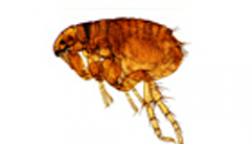
Flea problems are entirely controllable under professional care. Our treatment goal is to stop a problem at its source so it doesn’t keep coming back. Using state-of-the art equipment and methods, our licensed exterminators will inspect your home’s environment and construction to identify the problem and determine the best course of action. Contact us today!
Fleas can easily infest pets that go outdoors, but they can also enter pet free buildings. Since they can jump up about 7 inches and enter on peoples’ shoes and clothes, they can enter any building. Even if a building has been empty for 6 months, if there are flea larvae or cocoons present, then they could still be in hibernation and waiting for a host. A continual food source is not necessary for flea development.
Fleas are about 1/8 inch long and black to reddish-brown. They are laterally flat (sideways), with no wings and, with mouthparts designed for piercing skin and sucking blood. They are external parasites, of mammals and birds. Indoors they can be found in narrow cracks where pets frequently visit, including bedding, carpeting, and rest areas. They can also live outdoors in humid climates.
Fleas generally prefer cats, dogs, rabbits, or rats, but they will feed on humans. They may transmit plague, and have been linked to murine typhus. They are intermediate hosts of dog tapeworm, which can infest indoor cats, and rodent tapeworm, which can sometimes infest humans.
Females lay 4-8 eggs after each blood meal, which means females can lay over 400-500 eggs during their lifetime. They can hatch in about 2 to 5 days. The flea larvae are about 3/16 inch long, hairy, and wormlike with a distinct, brownish head but no eyes or legs. These larvae feed on dried blood and the excrement that adult fleas produce while feeding on their host. The larvae feed and crawl around for 8 to 15 days before building small, silken cocoons in which they pupate and develop into adults.

For successful flea control, the home, the pet and often, the yard must be treated. Yet the manner in which these treatments are performed can greatly influence the results. The following information will help frustrated pet owners effectively rid their homes and pets of fleas.
If you neglect to treat the pet’s environment (the premises), you will miss more than 90% of the developing flea population — the eggs, larvae and pupae. Before treatment, the pet owner should:
Inspect your pest after returning from any excursion out into the woods to avoid an infestation.